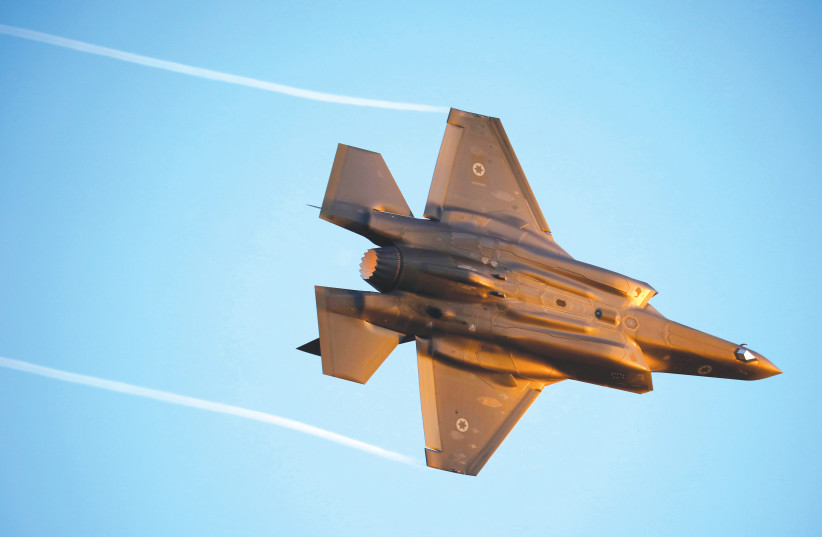Military exports by Israel brought in $11.2 billion last year, with 7% of that going to Arab countries that have signed the Abraham Accords, the Defense Ministry said last Wednesday.
The figure marked the highest number in the past 20 years, with Israel bringing in $8.3b. in 2020, $7.2b. in 2019, $7.5b. in 2018 and $9.3b. in 2017.
“Today, the Defense Ministry and the security industries mark a historic milestone,” said Brig.-Gen. (res) Yair Kulas, head of SIBAT, the International Defense Cooperation Directorate at the Defense Ministry (the military exports unit). “Israel’s defense exports have reached double-digit figures for the first time, reaching a 55% increase within two years.”
The volume of new contracts that were signed in 2021 jumped more than 30% compared with 2020.
“During the year, about 120 defense industries, with the help and support of SIBAT and the Defense Ministry, managed to sign hundreds of significant contracts around the world, including megadeals worth $1b. and more,” the ministry said Monday.

The world has looked to Israel for security and intelligence for many years, and the defense industry has leading international companies exporting to countries across the globe.
According to SIBAT, Israeli companies in 2021 exported missiles, rockets and air-defense systems (20% compared with 10% in 2020), drone systems and UAVs (9% compared with 6%), radars and electronic warfare (9% compared with 16%), observation and optoelectronics (5%), manned aircraft and avionics (9% compared with 13%), weapon stations and launchers (7% compared with 8%), vehicles and APCs (7% compared with 3%), C4I and communication systems (6% compared with 8%), ammunition and armament (4% compared with 16%), intelligence, information and cyber systems (4% compared with 5%), services and other (2%).
The largest distribution of Israeli defense exports was in Europe, with 41% (up from 30% in 2020); followed by Asia Pacific, with 34% (down 10% from 2020); North America, with 12% and 20% (down from 20% in 2021 and 26% in 2019); Abraham Accord countries, with 7%; Africa, with 4%; and Latin America, with 3% (up from 2%).
According to Kulas, the war in Ukraine, as well as other global conflicts, has led countries around the world to increase their defense budgets, including in Latin America.
“Every country looks at what happens on the battlefield and says, ‘Where do I stand?’” he said. “‘What do I need to be equipped with?’ These are countries that are not close to the geographical area of the conflict... the story is that every country understands that it has to help itself in terms of its security issues, without relying on any power or country to protect it.”
WHILE THE significant increase in defense exports in 2020 was not related to the war instigated by Russia, Defense Minister Gantz said, “Unfortunately, the war between Russia and Ukraine once again proves to the world what has always been clear to us: that security is a national need for every country and is not a luxury.”
Though “geopolitical wars are, of course, unfortunate and awful,” the need for security will lead Israel’s exports to increase even further, he said.
And despite “fierce competition” and continued concerns regarding coronavirus, “the demand for Israeli defense products has risen in the past year, manifesting in the sharp increase in transactions between countries,” Kulas said.
According to SIBAT, about 70% to 80% of Israeli defense products are exported, and Israel is among the top 10 defense exporters in the world.
“Looking ahead, shifting global priorities and partnerships such as the Abraham Accords create high demand for Israel’s cutting-edge technological systems,” Kulas said. “The Defense Ministry is working together with the security industries to ensure the continuing increase in defense cooperation.”
The number of contracts signed with Arab countries will continue to increase and will likely reach double digits, he said.
“If we look realistically at the coming years, there is great market potential, and with cautious assessment, we expect to reach double digits in the coming years with the countries that signed the Abrahamic Agreements,” Kulas said.
Gantz said the Defense Ministry “cooperates with partners around the world and has expanded its market by strengthening ties within the region as well as building new ties with countries around the world.”
Gantz signed historic memorandums of understanding with Morocco and Bahrain over the past year.
“Security relations are an integral component of Israel’s political relations and our ability to cooperate with other countries, and we work to strengthen those ties and create new security partnerships,” he said. “The peak in defense agreements in 2021 is first and foremost a means of strengthening the security of the State of Israel.”
A March report by the Stockholm Peace Research Institute (SIPRI) found that while global trade in major arms declined 4.6% over the past year, imports of major arms by European states were 19% higher from 2017-2021 than from 2012-2016 and accounted for 13% of global arms transfers. The largest arms importers in Europe were the UK (up 74%), Norway (up 343%) and the Netherlands (up 116%).
Israel placed No. 10 overall as an arms exporter, and its arms imports increased 19% from 2012-2016 and 2017-2021, with arms from the US accounting for 92% of all arms imports, including 31 F-35i stealth fighter jets and thousands of guided bombs.

Israeli arms exports were the highest ever from 2015-2019, accounting for 3% of the global total, SIPRI reported. Israel was then the world’s eighth-largest arms supplier, and its weapons exports were 77% higher than from 2010-2014, the report said.
